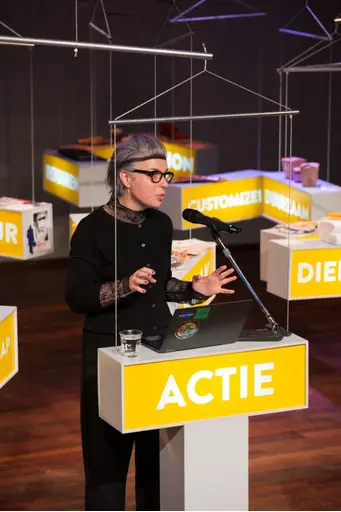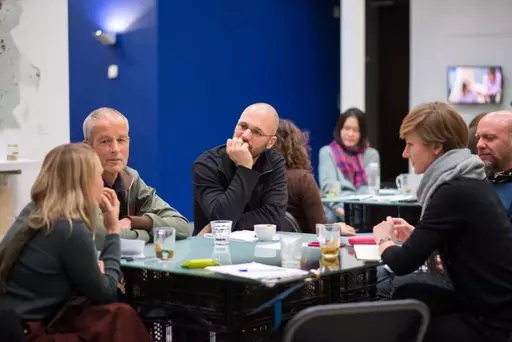
13 November 2019
Propositions #9/1 Training
Organizational Art & Public Program
This first day of the week of Propositions #9 Deserting from the Culture Wars consists of a training with Jonas Staal, and a public program including a lecture with Sven Lütticken.

This first day of the week of Propositions #9 Deserting from the Culture Wars consists of a training with Jonas Staal, and a public program including the lecture Deserting from the Culture Wars: an Introduction with Sven Lütticken.
Wednesday 13 november
TRAINING #1: 13.30–17.30
ORGANIZATIONAL ART with Jonas Staal.
The field of organizational art consists of artists that apply their competences in creating alternative institutional and infrastructural formations that challenge existing political, educational, and cultural discourses and modes of governing. Artist organizations are not merely critiques of existing institutions; they are concrete propositions of how to redistribute the means of constructing reality differently. Rather than striving for reform, they engage in what the New York-based group Not An Alternative has termed “institutional liberation,” as they repurpose means from existing institutions into new and imaginative ones that can reclaim the promise and practice of a fundamental egalitarian society. During the Organizational Art training, artist Jonas Staal, himself initiator of various artist organizations, such as New World Summit, provides a short introduction to this field of practice and challenges participants to work in groups to conceive their own new organizational art models. Participants are then asked to develop common narratives between themselves and translate these into new visual and institutional forms, to be presented and discussed later in the day during the evening program.
PUBLIC PROGRAM #1: 19.00-21:00
19:00–19:45 hrs
DOORS OPEN
19.30–19.45 hrs
WELCOME AND OPENING REMARKS
Maria Hlavajova (artistic and general director, BAK, basis voor actuele kunst, Utrecht)
19.45–20.30 hrs
LECTURE: DESERTING FROM THE CULTURE WARS: AN INTRODUCTION
(art historian, critic, and writer, Utrecht)
The notion of the avant-garde was originally a military one, and the Situationist International’s Guy Debord was obsessed by Clausewitz and with war games. In the 1970s and 1980s, notions of desertion inspired by Deleuze and Foucault came to feature in artistic and activist discourse; in 1977, Jean-Jacques Lebel wrote of “deserting, but positively” (déserter, mais positivement). In recent years, notions such as desertion and also fugitivity have again come to the fore, particularly in relation to institutional structures. What would it mean to “desert positively from the culture wars,” to prefer not to engage, in this space, at this moment, in this manner? How to desert constructively—by creating personae and organizations, operational fictions and para-institutions, connections and coalitions? In a situation marked by what has been termed the Fascist Transnational, could such a constellation become part of a new Progressive International?
20.30–21.00 hrs
REPORT FROM ORGANIZATIONAL ART TRAINING
The field of organizational art consists of artists that apply their competences in creating alternative institutional and infrastructural formations that challenge existing political, educational, and cultural discourses and modes of governing. Artist organizations are not merely critiques of existing institutions; they are concrete propositions of how to redistribute the means of constructing reality differently. Rather than striving for reform, they engage in what the New York-based group Not An Alternative has termed “institutional liberation,” as they repurpose means from existing institutions into new and imaginative ones that can reclaim the promise and practice of a fundamental egalitarian society.
During the Organizational Art training, artist Jonas Staal, himself initiator of various artist organizations, such as New World Summit, provides a short introduction to this field of practice and challenges participants to work in groups to conceive their own new organizational art models. Participants are then asked to develop common narratives between themselves and translate these into new visual and institutional forms, to be presented and discussed later in the day during the evening program.
ORGANIZATIONAL ART with Jonas Staal.
The field of organizational art consists of artists that apply their competences in creating alternative institutional and infrastructural formations that challenge existing political, educational, and cultural discourses and modes of governing. Artist organizations are not merely critiques of existing institutions; they are concrete propositions of how to redistribute the means of constructing reality differently. Rather than striving for reform, they engage in what the New York-based group Not An Alternative has termed “institutional liberation,” as they repurpose means from existing institutions into new and imaginative ones that can reclaim the promise and practice of a fundamental egalitarian society. During the Organizational Art training, artist Jonas Staal, himself initiator of various artist organizations, such as New World Summit, provides a short introduction to this field of practice and challenges participants to work in groups to conceive their own new organizational art models. Participants are then asked to develop common narratives between themselves and translate these into new visual and institutional forms, to be presented and discussed later in the day during the evening program.
PUBLIC PROGRAM #1: 19.00-21:00
19:00–19:45 hrs
DOORS OPEN
19.30–19.45 hrs
WELCOME AND OPENING REMARKS
Maria Hlavajova (artistic and general director, BAK, basis voor actuele kunst, Utrecht)
19.45–20.30 hrs
LECTURE: DESERTING FROM THE CULTURE WARS: AN INTRODUCTION
(art historian, critic, and writer, Utrecht)
The notion of the avant-garde was originally a military one, and the Situationist International’s Guy Debord was obsessed by Clausewitz and with war games. In the 1970s and 1980s, notions of desertion inspired by Deleuze and Foucault came to feature in artistic and activist discourse; in 1977, Jean-Jacques Lebel wrote of “deserting, but positively” (déserter, mais positivement). In recent years, notions such as desertion and also fugitivity have again come to the fore, particularly in relation to institutional structures. What would it mean to “desert positively from the culture wars,” to prefer not to engage, in this space, at this moment, in this manner? How to desert constructively—by creating personae and organizations, operational fictions and para-institutions, connections and coalitions? In a situation marked by what has been termed the Fascist Transnational, could such a constellation become part of a new Progressive International?
20.30–21.00 hrs
REPORT FROM ORGANIZATIONAL ART TRAINING
The field of organizational art consists of artists that apply their competences in creating alternative institutional and infrastructural formations that challenge existing political, educational, and cultural discourses and modes of governing. Artist organizations are not merely critiques of existing institutions; they are concrete propositions of how to redistribute the means of constructing reality differently. Rather than striving for reform, they engage in what the New York-based group Not An Alternative has termed “institutional liberation,” as they repurpose means from existing institutions into new and imaginative ones that can reclaim the promise and practice of a fundamental egalitarian society.
During the Organizational Art training, artist Jonas Staal, himself initiator of various artist organizations, such as New World Summit, provides a short introduction to this field of practice and challenges participants to work in groups to conceive their own new organizational art models. Participants are then asked to develop common narratives between themselves and translate these into new visual and institutional forms, to be presented and discussed later in the day during the evening program.
Long-Term ProjectPropositions for Non-Fascist LivingTrainings for the Not-YetTraining XXIITraining XXTraining XXITraining XVIIITraining XVI Training XVII Training XVPropositions #9/4 Training Propositions #9/3 Training Propositions #9/2 TrainingPropositions #9/1 Training Training XIIITraining XIITraining XIStranded FMTraining XTraining VIII Training IXTraining VII Training VI Training IV Training V Training IIIThe Basic Activist KitchenTraining II Training Program Training I Opening Trainings BAK, basis voor…